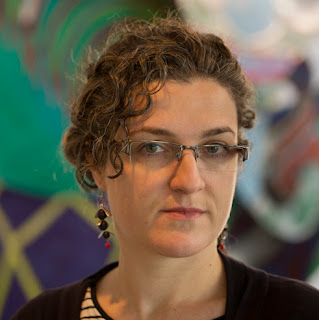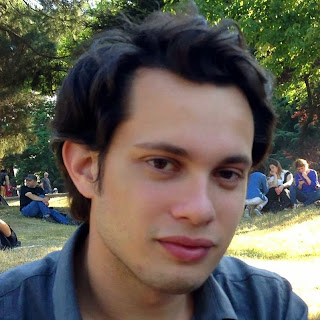Digital Folklore is an immersive audio adventure that takes place inside a fictional universe, but explores the real-world truths behind various expressions of internet culture and how each holds up a mirror to the society from which they emerge. This podcast is great for audio fiction fans who really really want to enjoy interview-based shows, or for listeners who love expert interviews and insights but long for something unique and unexpected. Join Perry Carpenter and Mason Amadeus as they ...
…
continue reading
Konten disediakan oleh Ottoman History Podcast. Semua konten podcast termasuk episode, grafik, dan deskripsi podcast diunggah dan disediakan langsung oleh Ottoman History Podcast atau mitra platform podcast mereka. Jika Anda yakin seseorang menggunakan karya berhak cipta Anda tanpa izin, Anda dapat mengikuti proses yang diuraikan di sini https://id.player.fm/legal.
Player FM - Aplikasi Podcast
Offline dengan aplikasi Player FM !
Offline dengan aplikasi Player FM !
Reconstituting the Stuff of the Nation
Manage episode 154524044 series 1125919
Konten disediakan oleh Ottoman History Podcast. Semua konten podcast termasuk episode, grafik, dan deskripsi podcast diunggah dan disediakan langsung oleh Ottoman History Podcast atau mitra platform podcast mereka. Jika Anda yakin seseorang menggunakan karya berhak cipta Anda tanpa izin, Anda dapat mengikuti proses yang diuraikan di sini https://id.player.fm/legal.
with Lerna Ekmekçioğlu
hosted by Chris Gratien
The World War I period irrevocably changed the life of Ottoman Armenians and ultimately heralded the end of Christian communities throughout most of Anatolia. However, following the Ottoman defeat in the war, the brief Armistice period witnessed efforts by Armenians in Istanbul to reconstitute their community in the capital. In this episode, Lerna Ekmekçioğlu explores these efforts and in particular activities to locate and gather Armenian orphans and widows dislocated by war and genocide.
 | Lerna Ekmekçioğlu is Assistant Professor of History at MIT. Her research focuses on the intersections of minority identity and gender in the modern Middle East. (see faculty page) |
 | Chris Gratien is a doctoral candidate at Georgetown University researching the social and environmental history of the Ottoman Empire and the modern Middle East. (see academia.edu) |
Episode No. 161
Release date: 27 June 2014
Location: Beyoğlu, Istanbul
Editing and Production by Chris Gratien
Bibliography courtesy of Lerna Ekmekçioğlu
Citation: "Reconstituting the Stuff of the Nation: Armenians of Istanbul during the Armistice Period," Lerna Ekmekçioğlu and Chris Gratien, Ottoman History Podcast, No. 161 (27 June 2014) http://www.ottomanhistorypodcast.com/2014/06/armenian-widows-orphans-istanbul.html.
SELECT BIBLIOGRAPHY
Lerna Ekmekcioglu, “A Climate for Abduction, A Climate for Redemption: The Politics of Inclusion during and after the Armenian Genocide.” Comparative Studies in Society and History 55, no. 3 (2013): 522–53.
Uğur Ümit Üngör, “Orphans, Converts, and Prostitutes: Social Consequences of War and Persecution in the Ottoman Empire, 1914–1923,” War in History 19, 2 (2012): 173–92.
Taner Akçam, The Young Turks’ Crime against Humanity: The Armenian Genocide and Ethnic Cleansing in the Ottoman Empire (Princeton: Princeton University Press, 2012), 287–339.
Victoria Rowe, “Armenian Women Refugees at the End of Empire: Strategies of Survival,” in Panikos Panayi and Pipa Virdee, eds., Refugees and the End of Empire: Imperial Collapse and Forced Migration in the Twentieth Century (New York: Palgrave Macmillan, 2011), 164.
Keith David Watenpaugh, “The League of Nations’ Rescue of Armenian Genocide Survivors and the Making of Modern Humanitarianism, 1920–1927,” American Historical Review 115, 5 (2010): 1315–39, here 1315.
Matthias Bjørnlund, “‘A Fate Worse than Dying:’ Sexual Violence during the Armenian Genocide,” in Dagmar Herzog, ed., Brutality and Desire: War and Sexuality in Europe’s Twentieth Century (New York: Palgrave Macmillan, 2009), 16–58.
Vahé Tachjian, “Gender, Nationalism, Exclusion: The Reintegration Process of Female Survivors of the Armenian Genocide,” Nations and Nationalism 15, 1 (2009): 60–80
Vahé Tachjian, “Recovering Women and Children Enslaved by Palestinian Bedouins,” in Raymond Kévorkian and Vahé Tachjian, eds., The Armenian General Benevolent Union, One Hundred Years of History (Cairo: AGBU, 2006).
Katharine Derderian, “Common Fate, Different Experience: Gender-Specific Aspects of the Armenian Genocide, 1915–1917,” Holocaust and Genocide Studies 19, 1 (May 2005): 1–25.
Vahakn Dadrian, “Children as Victims of Genocide: The Armenian Case,” Journal of Genocide Research 5 (2003): 421–38.
Vahram Shemmassian, “The League of Nations and the Reclamation of Armenian Genocide Survivors,” in Richard Hovannisian, ed., Looking Backward, Moving Forward: Confronting the Armenian Genocide (New Brunswick, N.J.: Transaction Publishers, 2003), 94.
Ara Sarafian, “The Absorption of Armenian Women and Children into Muslim Households as a Structural Component of the Armenian Genocide,” in Omer Bartov and Phyllis Mack, eds., In God’s Name: Genocide and Religion in the Twentieth Century (New York: Berghahn Books, 2001), 209–21.
Isabel Kaprielian-Churchill “Armenian Refugee Women: The Picture Brides 1920–1930,” Journal of American Ethnic History 12, 3 (1993): 3–29. Eliz Sanasarian, “Gender Distinction in the Genocidal Process: A Preliminary Study of the Armenian Case,” Holocaust and Genocide Studies 4, 4 (1989): 449–61.
36 episode
Manage episode 154524044 series 1125919
Konten disediakan oleh Ottoman History Podcast. Semua konten podcast termasuk episode, grafik, dan deskripsi podcast diunggah dan disediakan langsung oleh Ottoman History Podcast atau mitra platform podcast mereka. Jika Anda yakin seseorang menggunakan karya berhak cipta Anda tanpa izin, Anda dapat mengikuti proses yang diuraikan di sini https://id.player.fm/legal.
with Lerna Ekmekçioğlu
hosted by Chris Gratien
The World War I period irrevocably changed the life of Ottoman Armenians and ultimately heralded the end of Christian communities throughout most of Anatolia. However, following the Ottoman defeat in the war, the brief Armistice period witnessed efforts by Armenians in Istanbul to reconstitute their community in the capital. In this episode, Lerna Ekmekçioğlu explores these efforts and in particular activities to locate and gather Armenian orphans and widows dislocated by war and genocide.
 | Lerna Ekmekçioğlu is Assistant Professor of History at MIT. Her research focuses on the intersections of minority identity and gender in the modern Middle East. (see faculty page) |
 | Chris Gratien is a doctoral candidate at Georgetown University researching the social and environmental history of the Ottoman Empire and the modern Middle East. (see academia.edu) |
Episode No. 161
Release date: 27 June 2014
Location: Beyoğlu, Istanbul
Editing and Production by Chris Gratien
Bibliography courtesy of Lerna Ekmekçioğlu
Citation: "Reconstituting the Stuff of the Nation: Armenians of Istanbul during the Armistice Period," Lerna Ekmekçioğlu and Chris Gratien, Ottoman History Podcast, No. 161 (27 June 2014) http://www.ottomanhistorypodcast.com/2014/06/armenian-widows-orphans-istanbul.html.
SELECT BIBLIOGRAPHY
Lerna Ekmekcioglu, “A Climate for Abduction, A Climate for Redemption: The Politics of Inclusion during and after the Armenian Genocide.” Comparative Studies in Society and History 55, no. 3 (2013): 522–53.
Uğur Ümit Üngör, “Orphans, Converts, and Prostitutes: Social Consequences of War and Persecution in the Ottoman Empire, 1914–1923,” War in History 19, 2 (2012): 173–92.
Taner Akçam, The Young Turks’ Crime against Humanity: The Armenian Genocide and Ethnic Cleansing in the Ottoman Empire (Princeton: Princeton University Press, 2012), 287–339.
Victoria Rowe, “Armenian Women Refugees at the End of Empire: Strategies of Survival,” in Panikos Panayi and Pipa Virdee, eds., Refugees and the End of Empire: Imperial Collapse and Forced Migration in the Twentieth Century (New York: Palgrave Macmillan, 2011), 164.
Keith David Watenpaugh, “The League of Nations’ Rescue of Armenian Genocide Survivors and the Making of Modern Humanitarianism, 1920–1927,” American Historical Review 115, 5 (2010): 1315–39, here 1315.
Matthias Bjørnlund, “‘A Fate Worse than Dying:’ Sexual Violence during the Armenian Genocide,” in Dagmar Herzog, ed., Brutality and Desire: War and Sexuality in Europe’s Twentieth Century (New York: Palgrave Macmillan, 2009), 16–58.
Vahé Tachjian, “Gender, Nationalism, Exclusion: The Reintegration Process of Female Survivors of the Armenian Genocide,” Nations and Nationalism 15, 1 (2009): 60–80
Vahé Tachjian, “Recovering Women and Children Enslaved by Palestinian Bedouins,” in Raymond Kévorkian and Vahé Tachjian, eds., The Armenian General Benevolent Union, One Hundred Years of History (Cairo: AGBU, 2006).
Katharine Derderian, “Common Fate, Different Experience: Gender-Specific Aspects of the Armenian Genocide, 1915–1917,” Holocaust and Genocide Studies 19, 1 (May 2005): 1–25.
Vahakn Dadrian, “Children as Victims of Genocide: The Armenian Case,” Journal of Genocide Research 5 (2003): 421–38.
Vahram Shemmassian, “The League of Nations and the Reclamation of Armenian Genocide Survivors,” in Richard Hovannisian, ed., Looking Backward, Moving Forward: Confronting the Armenian Genocide (New Brunswick, N.J.: Transaction Publishers, 2003), 94.
Ara Sarafian, “The Absorption of Armenian Women and Children into Muslim Households as a Structural Component of the Armenian Genocide,” in Omer Bartov and Phyllis Mack, eds., In God’s Name: Genocide and Religion in the Twentieth Century (New York: Berghahn Books, 2001), 209–21.
Isabel Kaprielian-Churchill “Armenian Refugee Women: The Picture Brides 1920–1930,” Journal of American Ethnic History 12, 3 (1993): 3–29. Eliz Sanasarian, “Gender Distinction in the Genocidal Process: A Preliminary Study of the Armenian Case,” Holocaust and Genocide Studies 4, 4 (1989): 449–61.
36 episode
Semua episode
×Selamat datang di Player FM!
Player FM memindai web untuk mencari podcast berkualitas tinggi untuk Anda nikmati saat ini. Ini adalah aplikasi podcast terbaik dan bekerja untuk Android, iPhone, dan web. Daftar untuk menyinkronkan langganan di seluruh perangkat.




